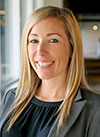
Five years ago, I wrote a piece for Wisconsin Lawyer with what I believed to be some very sound advice. In an article titled, “Is Life Balance Off? Lighten the Load,” I emphasized the importance of recognizing the season you are in, so you can lighten the load accordingly. If you have too much on your ship, throw the excess overboard. My explanation seemed simple enough: “When a storm threatens to capsize a ship, the sailors sometimes lighten the load. Like sailors during a storm, sometimes we need to throw things overboard as well.”1
Well, five years, two more kids, a promotion, service on two nonprofit boards, and a global pandemic later, I should have taken my own advice. At the end of 2021, I was sinking. Although I still believe lightening the load is practical advice, I now recognize that depending on the season we are in, lightening the load may look different. In hindsight, there are things I could have thrown overboard, but because of the weight of other things that I could not easily remove, I would have started sinking anyway.
I still believe in my message from 2017, but now I understand that sometimes, lightening the load does not simply mean throwing things overboard. Sometimes, to lighten the load, we need to fire up the flare gun and signal for help.
Begin with Honesty
Earlier this year, I hit a breaking point. In addition to managing my professional obligations, the stress of raising twin toddlers and two older children became overwhelming. The problem was exacerbated by some unhealthy habits I developed to cope with stress during the pandemic. Multiple people expressed their concern to me. Looking back, I cannot understate how thankful I am for the colleagues and friends who asked, “Are you okay?”
In those moments, I had two choices. I could have said “yes” and continued trying to pretend that everything was fine, that I had everything under control. Or I could be honest and say “no.” Admitting the truth and saying out loud that I was not okay was one of the best decisions I have ever made.
If we don’t start from a place of honesty, there is no room for progress. Even if you feel as though everything is “okay,” investigate yourself. Pause to ask yourself the tough questions … and be truthful to yourself when you answer. Is there anything holding you back from living a life that is emotionally and physically healthy? Is there anything in your life that’s causing you pain? What feels off?
After being honest with myself, and more important, with people who cared about me, I began experiencing the necessary and significant changes that helped lighten the load when I didn’t know how to do it on my own.
Don’t Let Pride Hamper You
While honesty centers around being truthful, humility involves a lack of pride. Humility means admitting I’m not perfect, and – more important – not trying to pretend I’m perfect in some imaginary performance for myself and those around me. Who doesn’t want the world to think they have it all together? I know I do. If people know that I’m not perfect, will they think less of me? Of course, we know that all humans are imperfect; yet, from a place of pride, we desperately cling to an unattainable standard to protect our egos. True strength, however, comes from acknowledging our weaknesses. Although I found myself in a dark place earlier this year, I am thankful because I ended up in a place of humility. Sometimes it takes reaching our breaking point to realize that we are human. It may only be when we are at the end of a rope that we recognize our weaknesses and admit that we need to make some changes.
Instead of going through the motions under the pretense of perfection, we must embrace our humanity and take care of ourselves. We must engage in real, purposeful, life-breathing self-care, or as author Emily Ley coined it, “do or die self-care.”
Ley describes it this way: “Imagine a beautiful car created with precision, craftsmanship, and attention to every tiny detail. The car is bright and shiny and beautiful its first trip around the block. But after a while, the car stops being a showpiece. It runs errands, shuffles kids back and forth to soccer practice, and endures rain, wind, snow, and mud. It gets bumped and scratched and left in the garage without washing. After a while, it’s obvious the car needs a good wash and a tune-up, a refill of gas, and maybe a coat of wax, or the car isn’t going to be good for anyone anymore. Isn’t that car just like you? If you run yourself ragged caring for everyone but yourself while expecting perfection from your hands, body, and mind, you’re in for a rough collision with reality.”2
I don’t know about you, but I want to be the bright and shiny car, not the clunker that crashes and burns. The only way to reach that condition, and remain there, is to acknowledge our weaknesses and admit that we regularly need to be “washed and repaired.” In the words of Erin Clifford, director of marketing and business development at Clifford Law Offices and the founder of Erin Clifford Wellness Coaching, “Make self-care a priority, and give yourself oxygen first. If you are overworked, overstressed, unhealthy and not taking care of your needs, you will not be at your best for your clients, colleagues, family and friends.”3
WisLAP Can Help
The Wisconsin Lawyers Assistance Program (WisLAP) offers confidential assistance to lawyers, judges, law students, and their families who are suffering from alcoholism, substance abuse, anxiety, and other issues that affect their well-being and law practice.
WisLAP helpline: (800) 543-2625
National Suicide Prevention Lifeline: 988; suicidepreventionlifeline.org
Reaching Goals Requires Hard Work
After being honest with myself and humbly acknowledging my weaknesses, the hard work remained. I can’t give you a secret recipe for the work that needs to be done, because I think it looks different for each person. I can tell you this, however: Having a system is crucial. In the book Atomic Habits, author James Clear aptly notes: “You do not rise to the level of your goals. You fall to the level of your systems. Your goal is your desired outcome. Your system is the collection of daily habits that will get you there.”4
My goal is to not merely avoid sinking but to thrive, choppy as the waters might be. My system consists of daily habits that will help me get there. We can access all the information in the world, but merely knowing what to do will not make a difference. We must do the work and stick to it. In John Maxwell’s book Intentional Living, he writes, “There is enormous magic in the tiny word do. When we tell ourselves, ‘I’ll do it,’ we unleash tremendous power....”5
Conclusion
Although I have never had more on my ship than I do right now, I have learned that when nothing can be tossed overboard, I can always ask for help. To do that, I must be honest with myself and others, I must be humble, and I must be willing to put in the work.
I am still on this journey. I have big goals, but I am focusing on my system. There are days when the waters rise, but when I stay focused on the system, I at least stay afloat, which is much closer to my goal of thriving than to the sinking I felt nine months ago.
Don’t let yourself sink. Even if the ship is overloaded and it feels like nothing can be removed, there is a way to thrive, but finding it involves honesty, humility, and hard work. Don’t fear authenticity. Embrace your humanity. Figure out the work that needs to be done and take the necessary steps to change.
In the interest of being honest, and humble, I have a confession to make: When I read my article from 2017, I question the feasibility of my advice. At that time, I had less experience juggling the countless burdens of life. Five years from now, my life experience will again be different, and I may come back with yet another iteration of what it means to “lighten the load.” What worked in the past might not work now, and what works now might not work in the future.
So, take what you can from my articles, but know this: Your well-being is important – and it is something only you control. Make your well-being a priority, and use the resources around you, whether articles, books, friends, family, spirituality, counselors, trusted colleagues, an employee assistance program, WisLAP, or something else. Don’t allow life to pass by while you sink; take control of your ship and you will be the best version of yourself – the person you were created to be.
Meet Our Contributors
You oversee multiple departments as senior vice president, general counsel at Waterstone. What do you like best about your job?
 The mortgage industry is highly competitive. Remaining competitive within the confines of the regulatory framework of the industry is a daily challenge, but it’s immensely rewarding. Not only do I enjoy leveraging my own knowledge and skillset to the company’s benefit, but I find great significance in empowering and equipping my department leaders to use their expertise to increase the company’s competitive advantage. What I love most is regularly having the opportunity to change people’s perception of the legal and compliance arms of the company so they no longer see us as a hindrance, but instead as one of their tools for integrous success.
The mortgage industry is highly competitive. Remaining competitive within the confines of the regulatory framework of the industry is a daily challenge, but it’s immensely rewarding. Not only do I enjoy leveraging my own knowledge and skillset to the company’s benefit, but I find great significance in empowering and equipping my department leaders to use their expertise to increase the company’s competitive advantage. What I love most is regularly having the opportunity to change people’s perception of the legal and compliance arms of the company so they no longer see us as a hindrance, but instead as one of their tools for integrous success.
Stephanie C. Ziebell, Waterstone Mortgage Corporation, Pewaukee
Become a contributor! Are you working on an interesting case? Have a practice tip to share? There are several ways to contribute to Wisconsin Lawyer. To discuss a topic idea, contact Managing Editor Karlé Lester at klester@wisbar.org. Check out our writing and submission guidelines.
Endnotes
1 Stephanie Ziebell, Is Life Balance Off? Lighten the Load, Wis. Law. (Jan. 2017), https://www.wisbar.org/NewsPublications/WisconsinLawyer/Pages/Article.aspx?Volume=90&Issue=5&ArticleID=25604.
2 Emily Ley, Grace, Not Perfection (Thomas Nelson, 2016).
3 Victor Li et al., 40 Wellness Tips to Help Lawyers Cope with Job Pressure, ABA J. (Jan. 4, 2022), www.abajournal.com/magazine/article/40-wellness-tips-to-help-lawyers-cope-with-job-pressure.
4 James Clear, Atomic Habits: An Easy & Proven Way to Build Good Habits & Break Bad Ones (Penguin UK, 2021).
5 John C. Maxwell, Intentional Living: Choosing a Life That Matters (Center Street, 2017, Reprint ed.).
» Cite this article: 95 Wis. Law. 39-41 (October 2022).
